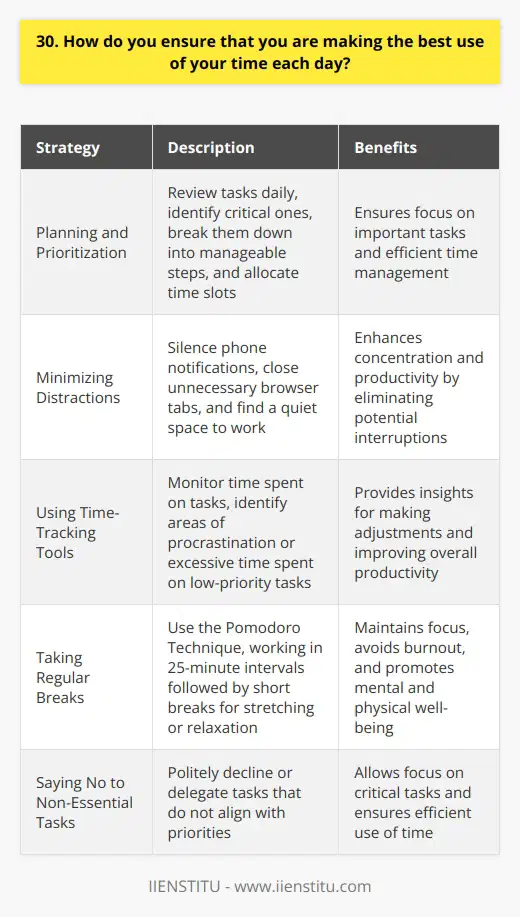
I still remember the day like it was yesterday. It was a chilly morning, and I was sipping my third cup of coffee, staring at a project timeline that seemed impossible to meet. My team and I were tasked with delivering a critical software update, and the deadline was looming ominously closer. "How on earth are we going to pull this off?" I thought to myself. Little did I know, this challenge would become one of my proudest time management success stories in my professional journey.
Understanding the Interviewer's Perspective
When hiring managers ask, "Can you share a time management success story from your professional journey?", they're doing more than just filling interview time. They're keen to uncover how you handle pressure, prioritize tasks, and ensure that deadlines are met without compromising quality. Time management isn't just about ticking off tasks; it's about orchestrating resources, people, and priorities to achieve goals efficiently.
Why This Question Matters
In today's fast-paced work environments, effective time management is crucial. Employers are looking for individuals who can:
1- Prioritize tasks effectively
2- Demonstrate organizational skills
3- Navigate tight deadlines gracefully
4- Utilize strategies like the critical path method project management strategy
5- Adapt to unforeseen challenges without losing momentum
By sharing a real-life example, you provide tangible proof of your capabilities rather than just stating you possess certain skills.
My Time Management Triumph
Interview Question: How Did Time Management Help When You Over-Committed?
Interview Question: What Challenges Your Problem Solving Most?
Interview Question: How Do Time Management Techniques Vary for You Weekdays vs. Weekends?
Interview Question: How Do You Handle Digital Marketing Fails?
Returning to my story, the project was behind schedule due to unexpected technical glitches and resource constraints. The initial reaction among the team was panic, but I knew that wouldn't get us anywhere. Taking a deep breath, I decided to employ a structured approach to tackle the issue head-on.
Assessing the Situation
First, I gathered the team for an open discussion. We needed to understand:
What were the critical tasks that absolutely had to be completed?
Which tasks could be delegated or delayed?
Where were the bottlenecks occurring?
We listed out all the tasks and identified dependencies using the critical path method project management strategy. This allowed us to see which tasks were critical for project completion and which had some flexibility.
Creating a Plan of Action
With the critical tasks identified, we:
1- Reassigned resources to the most crucial areas.
2- Broke down large tasks into smaller, manageable chunks.
3- Established mini-deadlines to keep everyone on track.
4- Set up daily stand-up meetings to monitor progress.
5- Implemented time-blocking techniques to focus on specific tasks without distractions.
Overcoming Challenges
Of course, the road wasn't smooth. There were moments when unforeseen issues popped up. Instead of allowing them to derail us, we:
Kept communication channels open.
Adjusted our plans while keeping the end goal in sight.
Motivated each other by celebrating small victories.
The Outcome
In the end, not only did we meet the deadline, but we also delivered a high-quality product that exceeded client expectations. The project became a benchmark for future endeavors, and our team's reputation within the company soared.
Breaking Down Effective Time Management Strategies
Reflecting on this experience, I've pinpointed several key strategies that contributed to our success:
1- Prioritization: Focusing on tasks that had the most significant impact.
2- Delegation: Trusting team members with responsibilities aligned with their strengths.
3- Utilizing Tools: Leveraging project management strategies like the critical path method.
4- Communication: Maintaining transparency and open dialogue.
5- Flexibility: Being prepared to adapt plans as needed.
The Importance of Prioritization
Effective prioritization ensures that you're not just busy, but productive. It's easy to conflate activity with progress, but without prioritizing, you might find yourself spinning wheels without moving forward.
Leveraging the Critical Path Method
The critical path method (CPM) is a project management tool that helps in planning all tasks that must be completed within a project. It identifies the longest stretch of dependent activities and measures the time required to complete them from start to finish.
Can you recount an instance from your professional journey where effective time management led to success?
In your career, can you provide an example when you successfully implemented time management skills?
How have you employed effective time management to succeed in your profession?
Could you provide a success story from your work experience where time management played a pivotal role?
Have there been any instances in your professional journey where time management proved critical for achievement?
Can you illustrate a scenario from your career where you achieved success through time management?
What was one situation in your professional life where you saw success thanks to good time management?
Can you share a success story from your professional life that emphasizes the importance of effective time management?
Describe a situation from your professional life when you effectively managed your time and achieved a successful outcome.
Is there a critical point from your work experience where you had to manage time proficiently for achieving your goals?
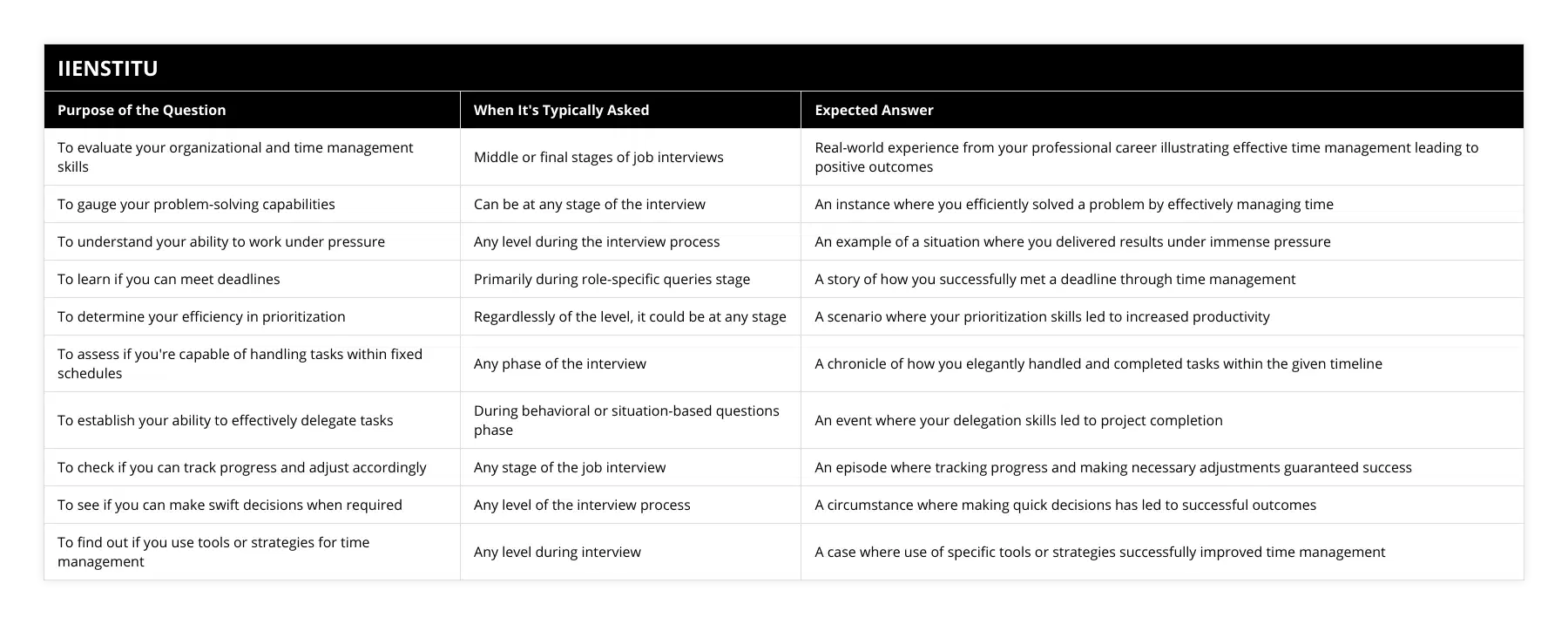
By applying CPM, we were able to:
Visualize the project timeline.
Identify which tasks could not be delayed.
Allocate resources more effectively.
Communication and Teamwork
No man is an island, and this is especially true in team projects. Regular meetings and updates kept everyone on the same page. It fostered a sense of accountability and camaraderie.
Tips for Answering the Interview Question
When you're asked to share a time management success story, here are some tips to craft a compelling answer:
Use the STAR Method: Structure your response by discussing the Situation, Task, Action, and Result.
Be Specific: Provide concrete examples and avoid vagueness.
Highlight Key Skills: Emphasize the strategies and skills you utilized.
Demonstrate Impact: Discuss the results and how they benefited the project or company.
Reflect on Learnings: Share what you learned and how it has shaped your professional approach.
Sample Answer Structure
1- Situation: Briefly describe the context.
2- Task: Explain the challenge or goal.
3- Action: Detail the steps you took.
4- Result: Share the outcome and its impact.
Similar Questions You Might Encounter
Interviewers might phrase the question differently. Be prepared to recognize and respond to variations such as:
"Can you recount an instance from your professional journey where effective time management led to success?"
"How have you employed effective time management to succeed in your profession?"
"Describe a situation from your professional life when you effectively managed your time and achieved a successful outcome."
Why Time Management Matters in Every Role
Regardless of the industry or position, time management is a universally valued skill. It impacts productivity, efficiency, and overall job satisfaction. Employers know that an individual who can manage their time well is likely to be:
More productive
Less stressed
Better at meeting deadlines
Capable of handling multiple responsibilities
Connecting to Broader Professional Skills
Time management is often linked with other essential professional skills such as:
Critical Thinking: Analyzing situations to make informed decisions.
Problem-Solving: Overcoming obstacles efficiently.
Leadership: Guiding teams towards common goals.
Personal Reflection
Looking back, that challenging project was a turning point in my career. Not only did it reinforce the importance of effective time management, but it also taught me valuable lessons about leadership and teamwork.
I realized that time management isn't just about managing minutes and hours; it's about managing yourself and your resources. It's about being proactive rather than reactive. And sometimes, it's about taking a step back to see the bigger picture.
Conclusion
Sharing a time management success story during an interview is your chance to showcase how you can add value to the organization. By narrating a genuine experience, you:
Demonstrate your problem-solving abilities
Showcase your initiative and leadership skills
Provide evidence of your ability to deliver results under pressure
So next time you're preparing for an interview, take a trip down memory lane. Reflect on those challenging projects where you came out on top, and be ready to tell your story. After all, your experiences are unique, and they might just be the key to landing that dream job.
References
Covey, S. R. (1989). The 7 Habits of Highly Effective People. Free Press.
Kerzner, H. (2009). Project Management: A Systems Approach to Planning, Scheduling, and Controlling. John Wiley & Sons.
Allen, D. (2001). Getting Things Done: The Art of Stress-Free Productivity. Penguin Books.
Blanchard, K., & Johnson, S. (1982). The One Minute Manager. William Morrow.
Drucker, P. F. (1967). The Effective Executive. Harper & Row.
Goldratt, E. M. (1997). Critical Chain. The North River Press.
Frequently Asked Questions
1. How do you prioritize tasks when you have multiple deadlines?
When faced with multiple deadlines, I prioritize tasks based on their urgency and importance. I assess each task's due date and potential impact on the project or company goals.
Categorizing Tasks
I categorize tasks into high, medium, and low priority levels. High-priority tasks have the nearest deadlines or the most significant consequences if not completed on time. Medium-priority tasks have more flexible deadlines or less critical outcomes, while low-priority tasks can be postponed without major repercussions.
Creating a Schedule
Once I've categorized the tasks, I create a detailed schedule that allocates time for each priority level. I dedicate the most time to high-priority tasks, ensuring they are completed before their deadlines. Medium-priority tasks are slotted in next, followed by low-priority tasks if time permits.
Staying Flexible
I remain flexible and adjust my schedule as needed. If a new high-priority task arises or priorities shift, I reassess and rearrange my task list accordingly. Regular check-ins with my team and manager help me stay aligned with project goals and deadlines.
Effective Time Management
Effective time management is key to handling multiple deadlines. I break down larger tasks into smaller, manageable steps and set mini-deadlines for each. This helps me stay on track and avoid last-minute rushes. I also minimize distractions and focus on one task at a time to maintain productivity.
By prioritizing tasks based on urgency and importance, creating a flexible schedule, and managing my time effectively, I successfully navigate multiple deadlines while delivering high-quality work.
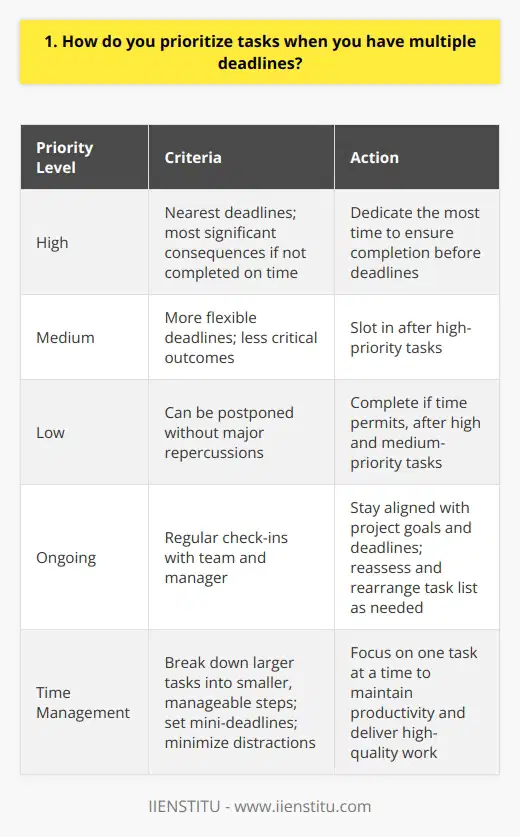
2. Describe a situation where you had to manage a heavy workload. How did you handle it?
In my previous role as a project manager, I often faced tight deadlines and a heavy workload. One particularly challenging situation involved managing multiple projects simultaneously, each with its own unique requirements and stakeholders.
Prioritizing Tasks
To handle the heavy workload, I first prioritized the tasks based on their urgency and importance. I created a detailed to-do list and allocated time slots for each task, ensuring that the most critical ones were addressed first.
Collaborating with the Team
I collaborated closely with my team members, delegating tasks according to their strengths and expertise. Regular communication and status updates helped us stay on track and identify any potential roadblocks early on.
Leveraging Time Management Techniques
I employed various time management techniques, such as the Pomodoro Technique, to maintain focus and avoid burnout. By breaking down the workload into manageable chunks and taking short breaks in between, I was able to maintain a steady pace and ensure quality work.
Staying Organized and Adaptable
Staying organized was key to managing the heavy workload. I used project management tools to keep track of deadlines, resources, and progress. Additionally, I remained adaptable and open to adjusting priorities as needed, based on changing circumstances or new information.
By prioritizing tasks, collaborating with my team, leveraging time management techniques, and staying organized and adaptable, I successfully managed the heavy workload and delivered all projects on time and to the satisfaction of the stakeholders. This experience strengthened my ability to handle pressure and multitask effectively.
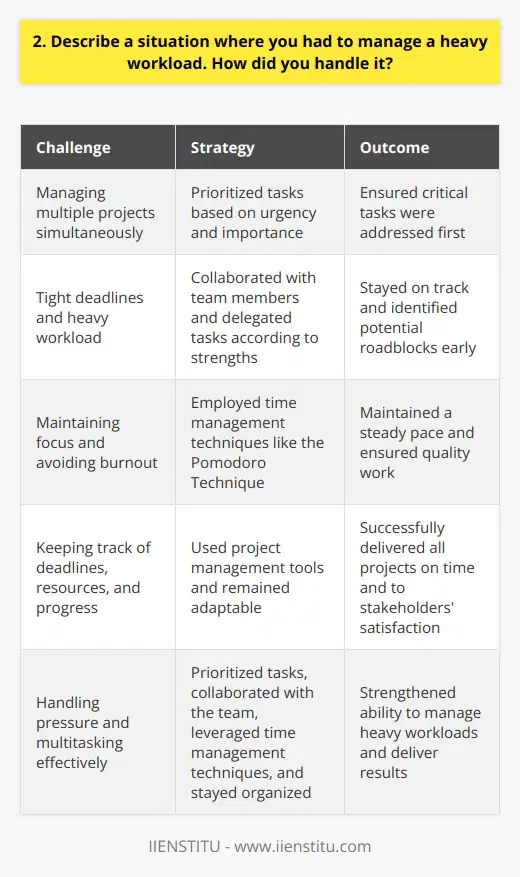
3. Have you ever had to balance personal and professional responsibilities? How did you manage your time effectively?
Balancing personal and professional responsibilities is a challenge that many of us face in our careers. I've had to navigate this myself, especially when I was working full-time while also caring for my elderly parents. It wasn't easy, but I learned some valuable strategies for managing my time effectively.
Prioritizing and Planning
The first step was to get clear on my priorities and create a realistic plan. I sat down and made a list of all my responsibilities, both at work and at home. Then, I ranked them in order of importance and urgency. This helped me focus on the most critical tasks and let go of the less essential ones.
I also started using a calendar and planner to map out my weeks and days. By blocking off time for specific activities, I could ensure that I was making progress on my goals while still leaving room for self-care and family time. It took some trial and error, but I eventually found a rhythm that worked for me.
Communicating and Asking for Help
Another key lesson was the importance of communication and support. I had to be honest with my manager about my situation and work with them to find solutions. Sometimes that meant adjusting my schedule or delegating tasks to teammates. It was scary to be vulnerable, but most people were understanding and willing to help.
I also learned to ask for help from friends and family when I needed it. Whether it was having someone pick up groceries or watch my parents for a few hours, these small acts of support made a big difference. It's okay to admit when you're struggling and reach out to your network.
Taking Care of Myself
Finally, I realized that I couldn't pour from an empty cup. To be my best at work and at home, I had to prioritize my own well-being too. That meant setting boundaries, saying no when necessary, and making time for activities that recharged me.
Whether it was going for a quick walk at lunch, meditating before bed, or spending quality time with loved ones on the weekends - these moments of self-care helped me show up more fully in all areas of my life. It's not selfish; it's essential.
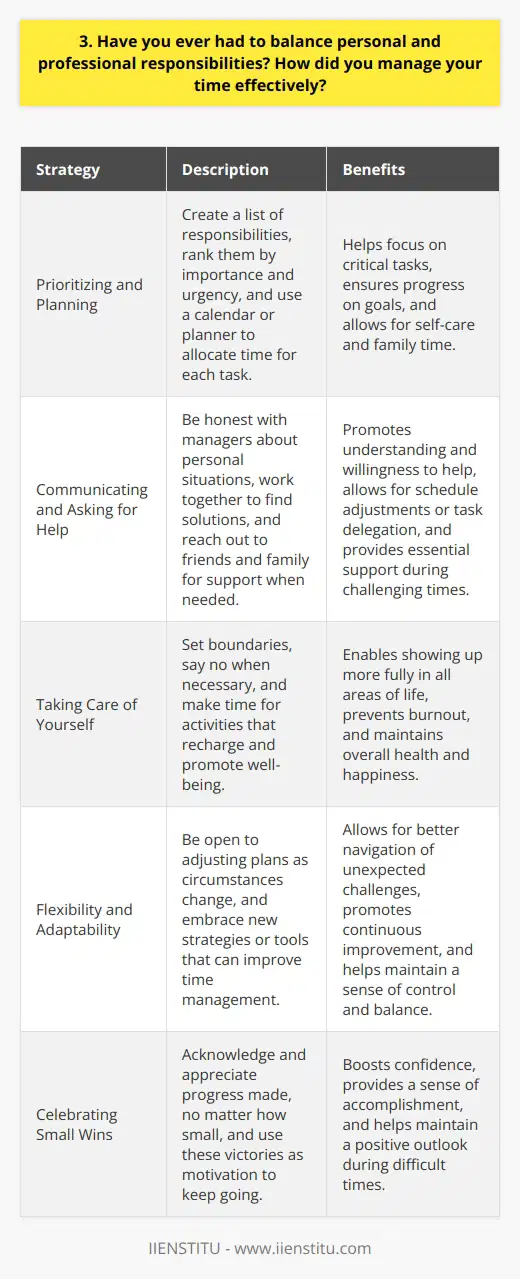
4. How do you ensure that you meet project deadlines consistently?
I have developed a reliable system to consistently meet project deadlines. This approach involves several key strategies:
Thorough Planning and Organization
I start by carefully reviewing the project requirements and creating a detailed plan. I break down the work into manageable tasks and set realistic deadlines for each one. Staying organized is crucial, so I use project management tools to keep everything on track.
Regular Progress Tracking
Monitoring progress is essential to catching any potential issues early. I check in on my tasks daily, comparing where I'm at against my projected timeline. If I notice I'm falling behind, I can quickly adjust my schedule or approach to get back on target.
Proactive Communication
I believe good communication is vital for meeting deadlines, especially when collaborating with a team. I provide regular status updates to keep everyone informed. If I foresee any challenges that could impact the timeline, I raise those concerns immediately and work with others to find solutions.
Focused and Efficient Work
When it's time to buckle down and complete tasks, I create a focused environment for myself. I minimize distractions and use productivity techniques like time blocking and the Pomodoro method. By working efficiently, I'm able to accomplish more in less time without sacrificing quality.
In my experience, this multi-pronged approach has been highly effective. On my last major project, I was able to deliver all of my assigned tasks on time, even finishing some ahead of schedule. My manager praised my reliability and organizational skills.
Of course, unexpected challenges can always arise, but I try to build some buffer time into my plans. And if significant roadblocks do appear, I face them head-on. I collaborate with my team to find creative solutions and put in extra time if needed to keep the project on track.
At the end of the day, consistently meeting deadlines comes down to diligence, communication, and a commitment to delivering quality work on time. It's a responsibility I take seriously in every project I'm a part of.
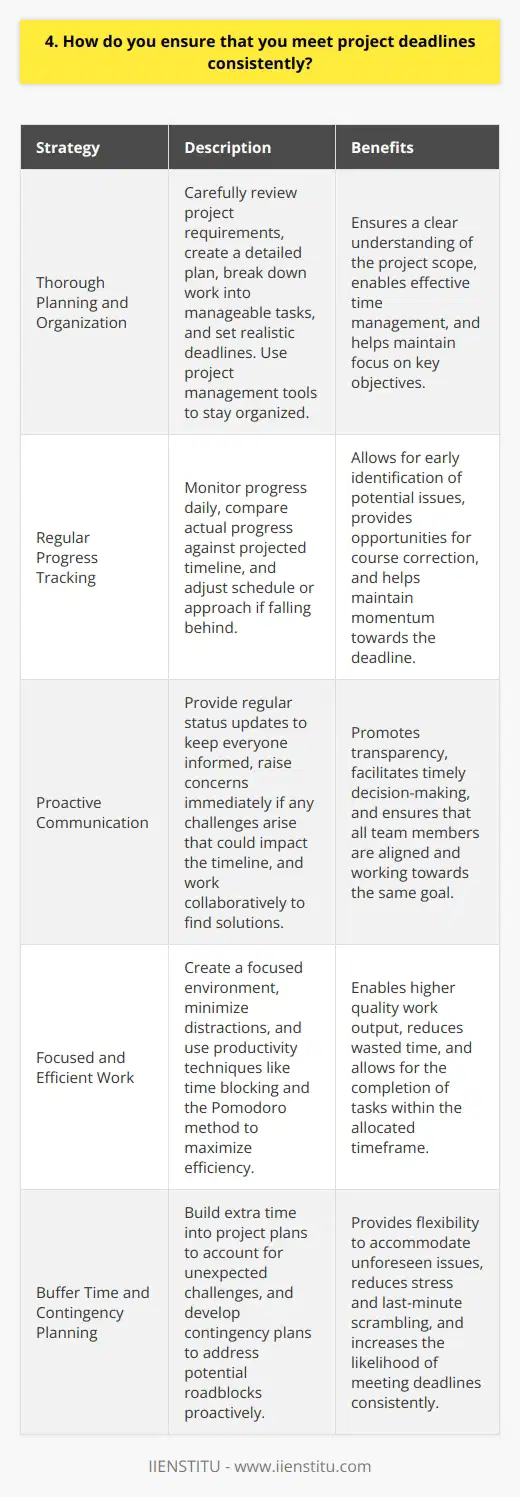
5. Describe a time when you had to work under pressure. How did you manage your time to complete the task successfully?
In my previous role as a marketing coordinator, I faced a situation where I had to work under immense pressure. Our team was tasked with organizing a product launch event within a tight two-week deadline.
Prioritizing Tasks
To manage my time effectively, I first prioritized the most critical tasks that needed immediate attention. I created a to-do list and ranked each item based on its urgency and importance.
Breaking Down Projects
I broke down larger projects into smaller, manageable chunks. This allowed me to focus on one step at a time and avoid feeling overwhelmed by the magnitude of the task at hand.
Collaborating with Team Members
I actively collaborated with my team members and delegated tasks based on each person's strengths and availability. By working together and supporting one another, we were able to divide the workload and make significant progress.
Setting Realistic Deadlines
I set realistic deadlines for myself and communicated them clearly to my team and superiors. This helped manage expectations and ensured that everyone was on the same page regarding the project timeline.
Staying Organized and Focused
To stay organized, I used project management tools like Trello to track my progress and keep all relevant information in one place. I also minimized distractions by finding a quiet workspace and taking short breaks when needed to recharge.
By implementing these strategies, I was able to successfully complete the product launch event on time, despite the intense pressure. The event was a great success, and I received positive feedback from my manager and colleagues for my ability to work efficiently under tight deadlines.
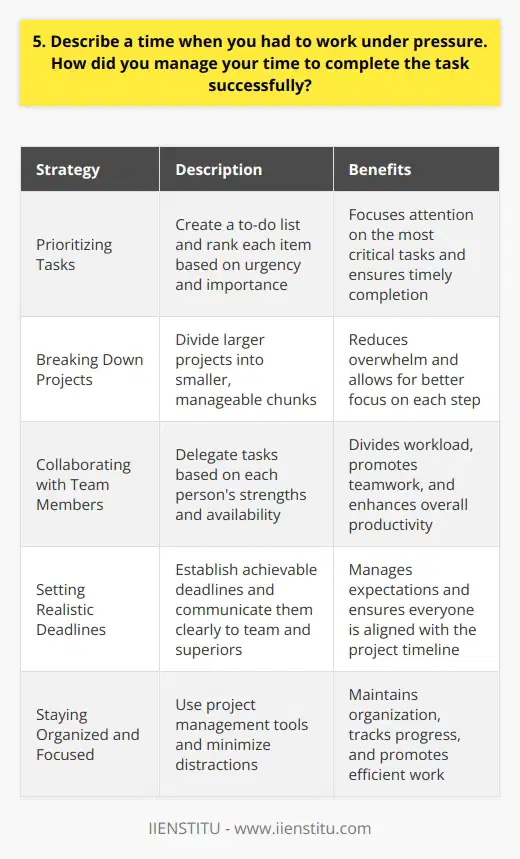
6. How do you handle interruptions or unexpected changes to your schedule?
When it comes to handling interruptions or unexpected changes to my schedule, I take a proactive approach. I understand that in any fast-paced work environment, unexpected situations can arise at any moment. Rather than getting flustered or overwhelmed, I remain calm and composed.
Prioritizing Tasks
The first thing I do when faced with an interruption is quickly assess the urgency and importance of the new task. I mentally prioritize my existing responsibilities and determine if any can be temporarily put on hold. This allows me to allocate my time and energy efficiently, ensuring that the most critical tasks are addressed promptly.
Effective Communication
Clear communication is key when dealing with schedule changes. I make sure to inform my colleagues or supervisors about any adjustments I need to make. By keeping everyone in the loop, I minimize confusion and maintain a smooth workflow.
Adaptability and Flexibility
I've learned that being adaptable is crucial in the workplace. I'm always ready to pivot and adjust my plans as needed. Whether it's tackling an unexpected project or stepping in to assist a teammate, I approach each challenge with a positive attitude and a willingness to learn and grow.
Staying Organized
To effectively handle interruptions, I rely on my strong organizational skills. I keep detailed to-do lists and use time management tools to stay on top of my tasks. This helps me quickly reprioritize when necessary and ensures that nothing falls through the cracks.
At the end of the day, I believe that handling interruptions and schedule changes is all about maintaining a flexible mindset. By staying calm, communicating effectively, and adapting to new situations, I'm able to navigate unexpected challenges and deliver high-quality work consistently.
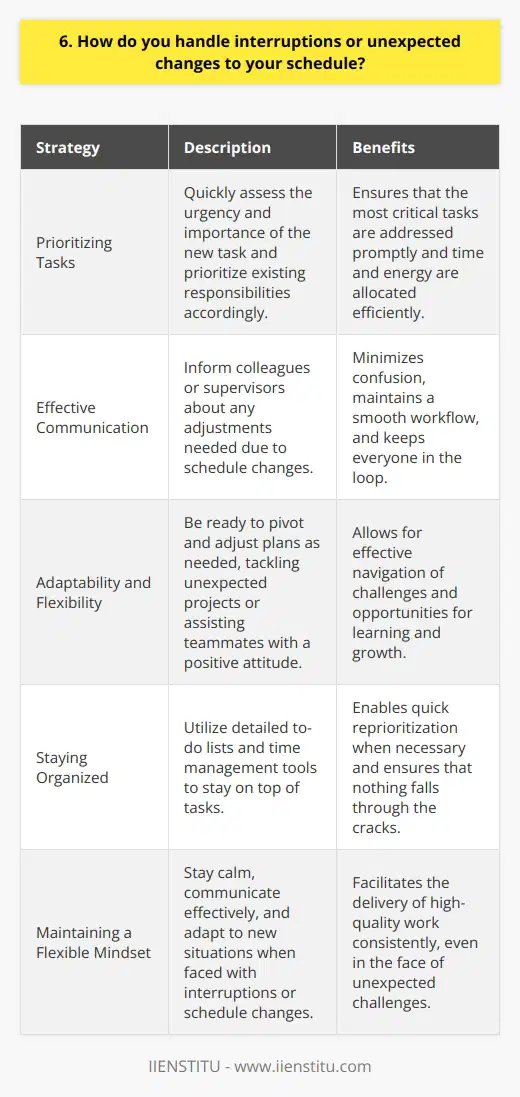
7. Have you ever had to delegate tasks to others to manage your time more efficiently? How did you approach this?
Yes, I have had to delegate tasks to manage my time more efficiently on several occasions. One memorable example was when I was leading a project team with a tight deadline. To ensure we met our goals, I had to carefully assess each team member's strengths and assign tasks accordingly.
Assessing Team Members' Strengths
I took the time to understand each person's skills, experience, and workload. This allowed me to match tasks with the most suitable individuals, maximizing efficiency and quality. For instance, I assigned data analysis to our Excel expert and client communication to our best relationship-builder.
Communicating Expectations Clearly
When delegating, I made sure to provide clear instructions, deadlines, and expected outcomes. I also encouraged questions and feedback to ensure everyone understood their responsibilities. Regular check-ins helped me monitor progress and address any issues promptly.
Trusting and Empowering the Team
I trusted my team to complete their assigned tasks without micromanaging. This empowered them to take ownership and make decisions within their areas of responsibility. It also freed up my time to focus on overall strategy and coordination.
Learning and Adapting
Throughout the project, I remained open to learning from my team's experiences and insights. If someone encountered challenges or had suggestions for improvement, I listened and adapted our approach as needed. This collaborative mindset helped us work more efficiently and deliver excellent results.
In the end, delegating tasks effectively allowed us to leverage each team member's strengths, meet our tight deadline, and achieve success. It was a valuable lesson in the power of delegation and teamwork.
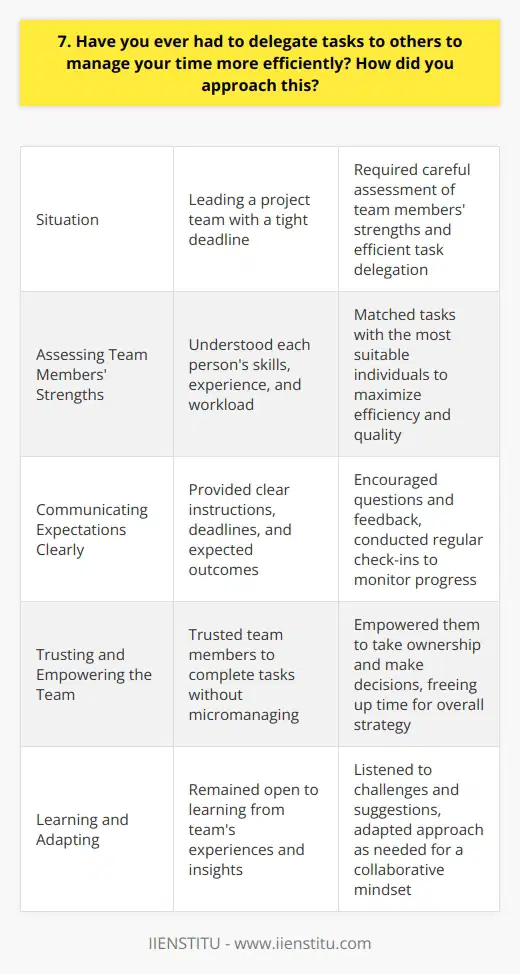
8. Describe a time when you had to juggle multiple projects simultaneously. How did you prioritize and manage your time?
In my previous role as a project manager, I often had to manage multiple projects simultaneously. It was challenging, but I learned to prioritize tasks effectively and manage my time wisely.
Prioritizing Tasks
I started by creating a list of all the projects and their deadlines. Then, I assessed each project's urgency and importance, considering factors like client expectations and potential impact on the company's goals. This helped me determine which tasks needed my immediate attention and which ones could wait a bit.
Breaking Down Projects
To make the workload more manageable, I broke down each project into smaller, actionable tasks. I set mini-deadlines for these tasks to ensure steady progress on all fronts. This approach helped me avoid feeling overwhelmed and allowed me to focus on one thing at a time.
Effective Time Management
I used a combination of time-blocking and the Pomodoro Technique to manage my time effectively. I dedicated specific time blocks to each project, ensuring that I gave adequate attention to all of them. During these blocks, I worked in focused 25-minute intervals, followed by short breaks. This kept me productive and prevented burnout.
Collaboration and Delegation
I also learned the importance of collaboration and delegation. I regularly communicated with my team members, keeping them updated on project statuses and any potential roadblocks. When necessary, I delegated tasks to team members with the right skills and expertise, freeing up my time to focus on high-priority tasks.
Staying Organized
To stay on top of everything, I used project management tools like Trello and Asana. These tools helped me track progress, set reminders, and communicate with my team. I also made it a habit to review and adjust my priorities regularly, ensuring that I was always working on the most critical tasks.
Managing multiple projects simultaneously was a challenging experience, but it taught me valuable lessons about prioritization, time management, and collaboration. I believe these skills have made me a more effective and efficient professional, ready to tackle any challenge that comes my way.
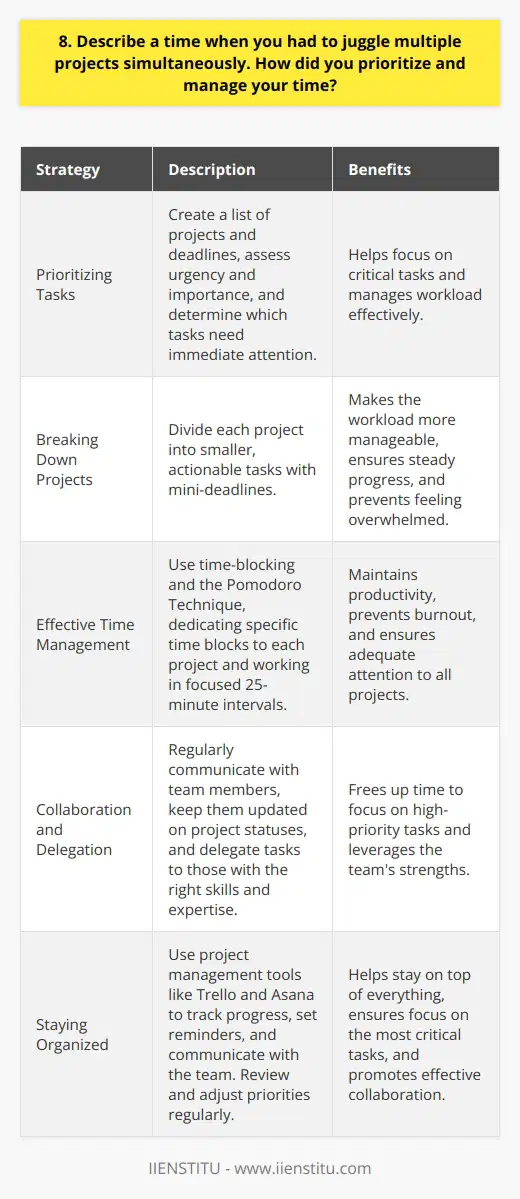
9. Have you ever had to work on a project with a tight deadline? How did you ensure that you met the deadline?
Yes, I have worked on projects with tight deadlines many times throughout my career. One particularly challenging project comes to mind.
Developing a New Software Feature
Our client requested a new feature for their software, and we only had two weeks to deliver. I knew it would be tough, but I was determined to meet the deadline.
Breaking Down the Task
First, I broke down the project into smaller, manageable tasks. This helped me prioritize and focus on what needed to be done.
Collaborating with the Team
I collaborated closely with my team members, assigning tasks based on everyone's strengths. We had daily stand-up meetings to discuss progress and address any obstacles.
Putting in Extra Hours
I put in extra hours when needed, sometimes working late into the night. It was tiring, but I knew it was necessary to meet the deadline.
Testing and Refining
As we neared the deadline, we focused on testing and refining the feature. We wanted to ensure it was bug-free and met the client's expectations.
Delivering on Time
Thanks to our hard work and dedication, we successfully delivered the new feature on time. The client was thrilled with the result, and I felt a great sense of accomplishment.
Lessons Learned
This experience taught me the importance of breaking down tasks, collaborating with others, and putting in extra effort when needed. It's not always easy, but with the right mindset and approach, you can meet even the tightest deadlines.
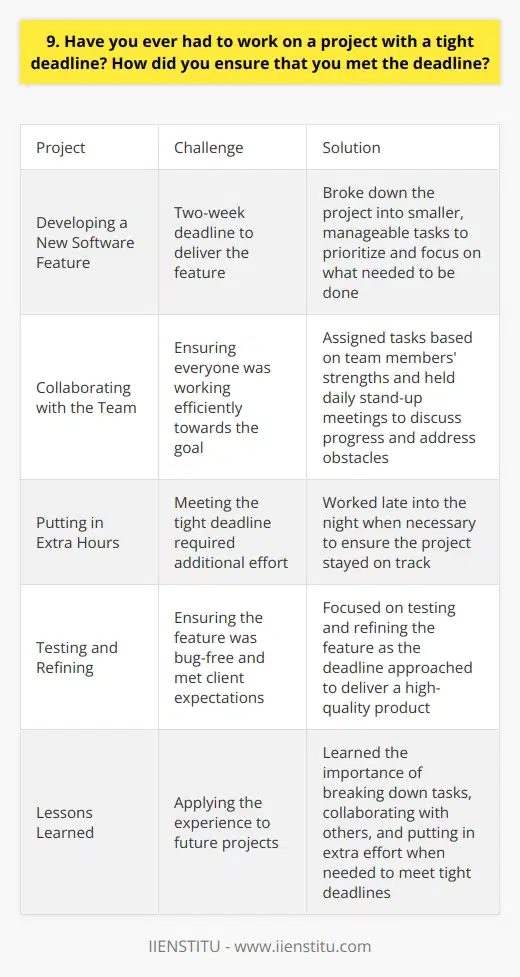
10. How do you avoid procrastination and stay focused on your tasks?
To avoid procrastination and stay focused on my tasks, I have developed several effective strategies over the years. One of the most important things I do is break down large projects into smaller, manageable steps. This helps me feel less overwhelmed and more motivated to tackle each task one by one.
Prioritizing Tasks
I also prioritize my tasks based on their urgency and importance. I use a planner to keep track of deadlines and ensure that I'm making steady progress on each project. By focusing on the most critical tasks first, I can avoid the stress of last-minute rushes and maintain a consistent level of productivity throughout the day.
Minimizing Distractions
Another key strategy I use is minimizing distractions. I turn off notifications on my phone and computer when I need to concentrate, and I find a quiet space where I can work without interruptions. If I'm working on a particularly challenging task, I might even use noise-canceling headphones to block out any background noise.
Taking Breaks
Of course, it's also important to take breaks and recharge when needed. I like to step away from my desk every hour or so to stretch my legs and clear my mind. This helps me avoid burnout and maintain my focus over the long term.
Staying Accountable
Finally, I find that staying accountable to others can be a powerful motivator. Whether it's checking in with a colleague or setting deadlines with my supervisor, knowing that someone else is counting on me to get things done helps me stay on track and avoid procrastination.
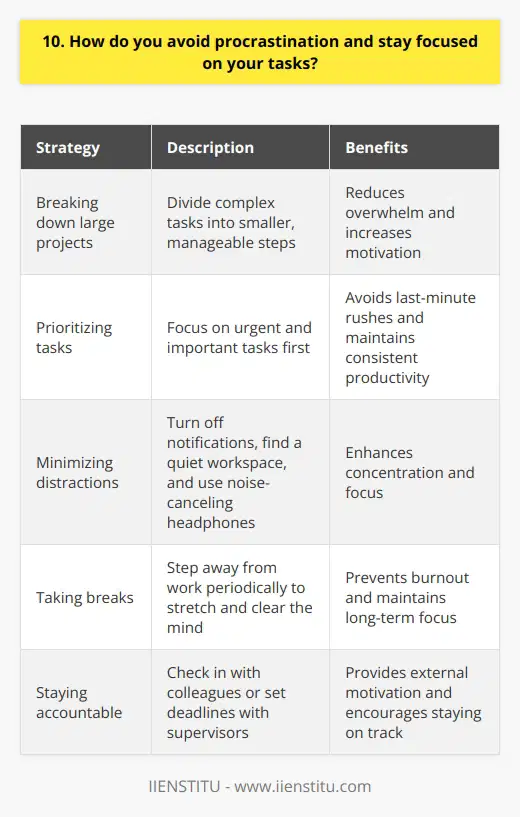
11. Describe a time when you had to adapt your time management strategy to accommodate a change in priorities.
I once faced a situation where I had to adapt my time management strategy due to changing priorities. It was during a critical project with a tight deadline. I had carefully planned my tasks and allocated time for each one. However, midway through the project, our client requested some significant changes that required immediate attention.
Assess the Situation
I quickly realized that my current plan wouldn't work. I needed to reassess my priorities and adjust my schedule. I took a step back, evaluated the new requirements, and identified which tasks were most critical.
Communicate with the Team
I discussed the changes with my team and delegated some of my tasks to them. This helped distribute the workload and ensured we could meet the new expectations without compromising quality.
Prioritize and Adapt
I restructured my schedule, focusing on the most important and time-sensitive tasks first. I broke down larger tasks into smaller, manageable chunks. This allowed me to make steady progress while remaining flexible enough to handle any further changes.
Leverage Technology
I used project management tools to keep track of deadlines, communicate with team members, and monitor progress. These tools helped me stay organized and efficient during this challenging time.
Stay Focused and Communicate
I minimized distractions, stayed focused, and put in extra hours when needed. I kept open lines of communication with my team and the client. Regular updates kept everyone informed and helped manage expectations.
Reflect and Learn
In the end, we successfully delivered the project on time and exceeded the client's expectations. I learned valuable lessons about adaptability, prioritization, and effective communication. This experience strengthened my ability to handle unexpected changes and manage my time effectively under pressure.
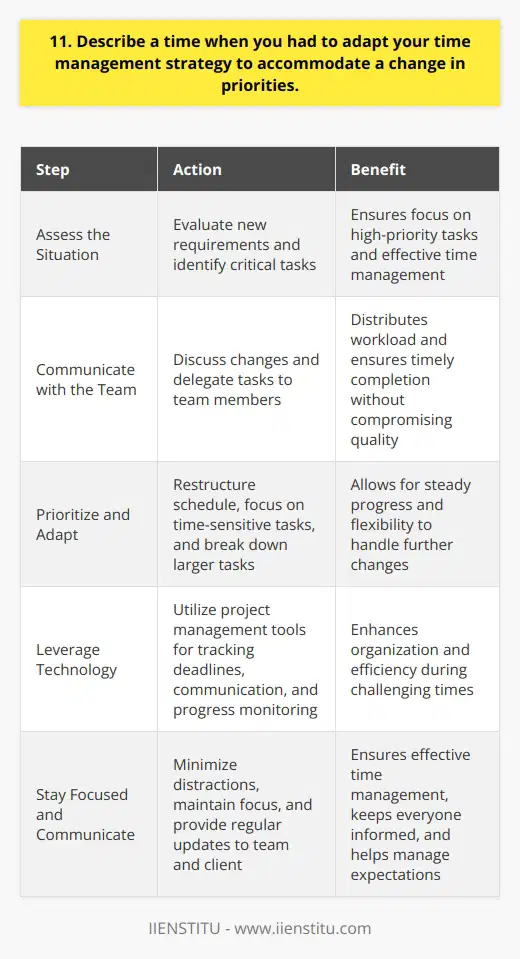
12. How do you ensure that you have a healthy work-life balance?
Maintaining a healthy work-life balance is crucial for both personal well-being and professional success. I believe that setting clear boundaries between work and personal time is key.
Prioritizing Tasks
I start by prioritizing my tasks and focusing on the most important ones during work hours. This helps me stay productive and avoid getting bogged down in less critical tasks.
I also make sure to take regular breaks throughout the day to recharge and refocus. Even just a few minutes of stretching or deep breathing can make a big difference.
Unplugging from Work
When I'm not at work, I make a conscious effort to unplug and disconnect from work-related activities. I avoid checking my work email or taking work calls during my personal time.
Instead, I focus on spending quality time with family and friends, pursuing hobbies, and engaging in activities that bring me joy and relaxation. For me, that means going for hikes, trying new recipes, and catching up with loved ones over coffee.
Communicating Boundaries
I also believe in open communication with my team and supervisors about my boundaries and limits. If I feel like my workload is becoming overwhelming or affecting my personal life, I proactively discuss solutions and adjustments.
By being upfront about my needs and expectations, I can work with my colleagues to find a balance that works for everyone. It's not always easy, but it's essential for long-term success and happiness.
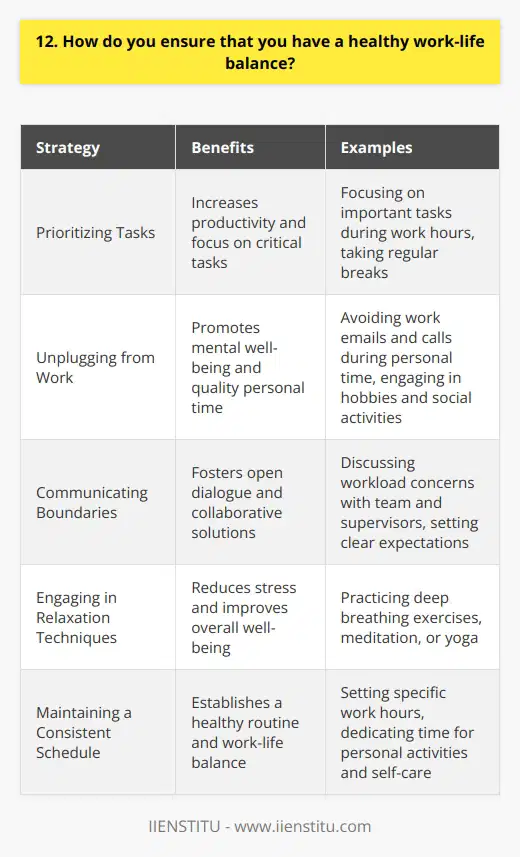
13. Have you ever had to work overtime to meet a deadline? How did you manage your time to avoid burnout?
Yes, I've had to work overtime to meet deadlines on several occasions throughout my career. One memorable instance was when our team was tasked with delivering a critical project for a high-profile client under a tight timeline.
Prioritizing Tasks and Setting Milestones
To manage my time effectively and avoid burnout, I first prioritized my tasks based on their urgency and importance. I broke down the project into smaller, manageable milestones and set realistic deadlines for each one.
Collaborating with Team Members
I collaborated closely with my team members, delegating tasks according to each person's strengths and expertise. We held regular check-ins to ensure everyone was on track and to address any challenges or roadblocks promptly.
Taking Short Breaks and Practicing Self-Care
During the overtime period, I made sure to take short breaks to recharge and maintain my focus. I also prioritized self-care by getting enough sleep, eating healthy meals, and engaging in stress-relieving activities like meditation and exercise.
Communicating with Stakeholders
Throughout the process, I maintained open communication with stakeholders, providing regular updates on our progress and managing expectations. This helped build trust and ensured everyone was aligned on the project's goals and timeline.
Reflecting on Lessons Learned
Looking back, I learned the importance of proactive planning, effective collaboration, and self-care in managing overtime work. These experiences have made me a more resilient and adaptable professional, ready to tackle challenging projects while maintaining a healthy work-life balance.
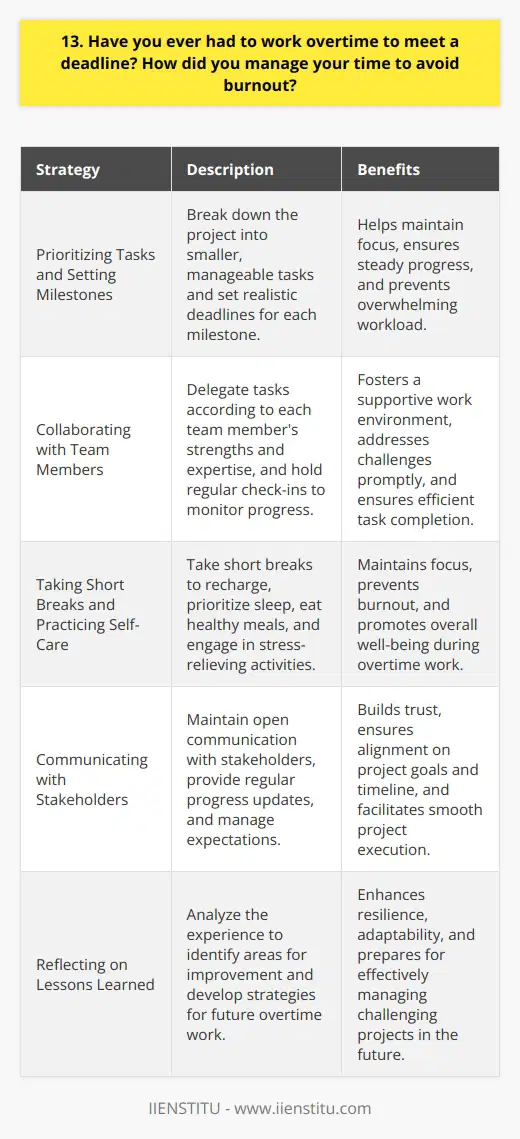
14. Describe a time when you had to collaborate with a team to complete a project on time. How did you coordinate your efforts?
In my previous role as a marketing coordinator, I collaborated with a cross-functional team to launch a new product. We had a tight deadline of three months to complete the project.
Establishing Clear Communication Channels
I took the initiative to set up regular team meetings and created a shared project management tool. This allowed us to stay aligned on tasks, deadlines, and progress updates.
Leveraging Individual Strengths
I recognized that each team member brought unique skills to the table. I worked closely with the product development team to understand the key features and benefits of the product.
Meanwhile, I collaborated with the creative team to develop compelling marketing materials that highlighted these features. By leveraging everyone's strengths, we were able to work more efficiently.
Adapting to Challenges
Halfway through the project, we encountered a technical issue that threatened to derail our timeline. I quickly organized a brainstorming session with the team to identify potential solutions.
We decided to bring in an external consultant who had expertise in resolving similar issues. This proactive approach helped us overcome the obstacle and stay on track.
Celebrating Milestones and Success
Throughout the project, I made sure to celebrate key milestones and acknowledge the hard work of the team. When we successfully launched the product on time, I organized a team lunch to recognize everyone's contributions.
This experience taught me the importance of clear communication, leveraging individual strengths, and adapting to challenges when working on a team project. I'm proud of what we accomplished together.
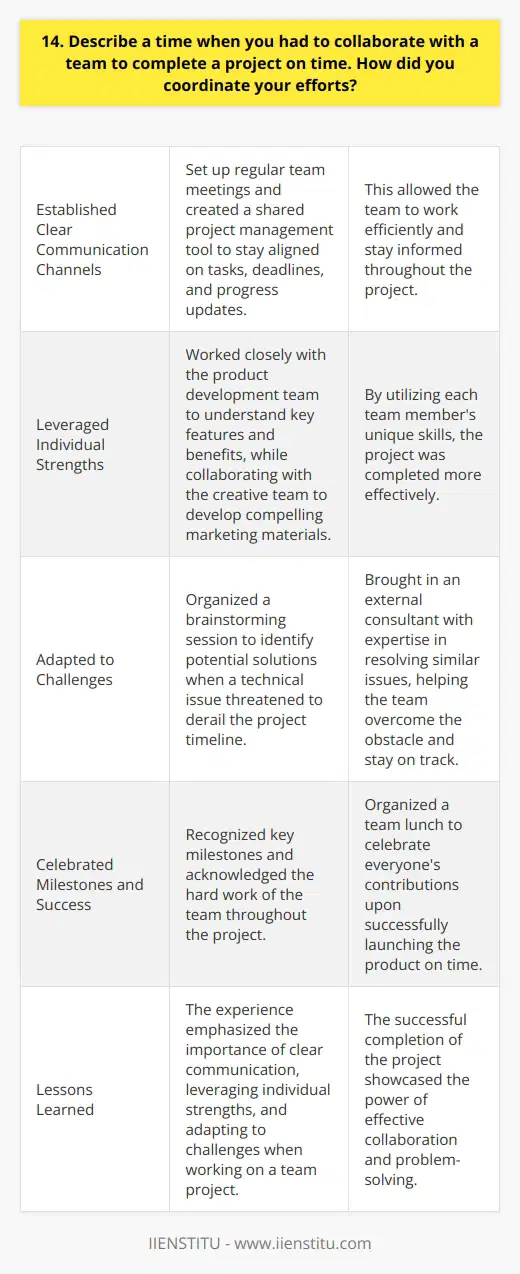
15. How do you handle tasks that are less interesting or enjoyable but still need to be completed?
When faced with less exciting tasks, I find it helpful to break them down into smaller, manageable steps. This allows me to focus on one piece at a time and feel a sense of progress as I complete each part.
Prioritizing and Planning
I prioritize the less interesting tasks based on their importance and deadlines. By creating a clear plan of action, I can stay organized and motivated to tackle them efficiently. Setting personal milestones and rewards for completing certain portions of the work also helps me stay engaged.
Finding Purpose and Connection
Even if a task seems mundane, I try to find a deeper purpose or connection to the overall goals of the project or company. By understanding how my efforts contribute to the bigger picture, I feel more invested in the outcome and motivated to do my best.
Maintaining a Positive Attitude
I believe that approaching less enjoyable tasks with a positive mindset can make a significant difference. Instead of dwelling on the unpleasant aspects, I focus on the opportunities for growth, skill development, and the satisfaction of a job well done. Collaborating with colleagues and maintaining a supportive work environment also helps keep my spirits high.
In my experience, by combining effective strategies like breaking tasks into smaller steps, finding purpose, and maintaining a positive outlook, I can successfully navigate and complete even the most challenging or less interesting tasks with dedication and professionalism.
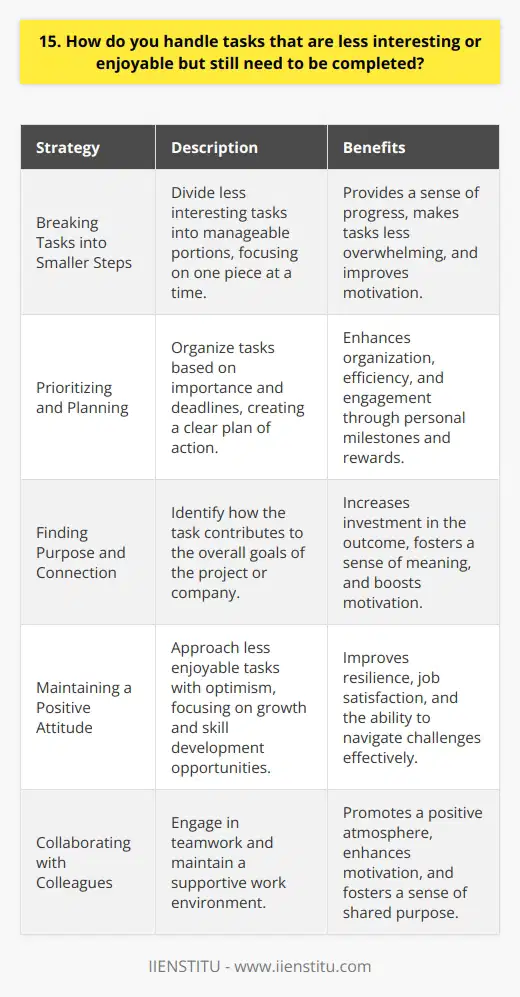
16. Have you ever had to learn a new skill or tool to complete a project more efficiently? How did you manage your time while learning?
I recently had to learn a new project management tool to streamline our team's workflow. It was challenging at first, but I broke it down into smaller, manageable tasks.
Setting Priorities
I assessed which features were essential for our immediate needs and focused on mastering those first. This allowed me to start using the tool quickly while continuing to learn more advanced functions.
Utilizing Resources
I took advantage of online tutorials, user forums, and the tool's documentation to guide my learning process. Whenever I encountered a roadblock, I reached out to colleagues who had experience with the tool for advice and tips.
Practice Makes Perfect
I dedicated time each day to practice using the tool, applying what I learned to real-world projects. This hands-on experience helped me retain the knowledge and become more proficient in a shorter time frame.
Balancing Learning and Work
To manage my time effectively, I allocated specific hours for learning and practice, while ensuring that I still met my regular work obligations. I also leveraged the tool's time-saving features to boost my productivity as I continued to learn.
By being proactive, seeking help when needed, and applying my knowledge consistently, I successfully learned the new tool and improved our team's efficiency without compromising my other responsibilities.
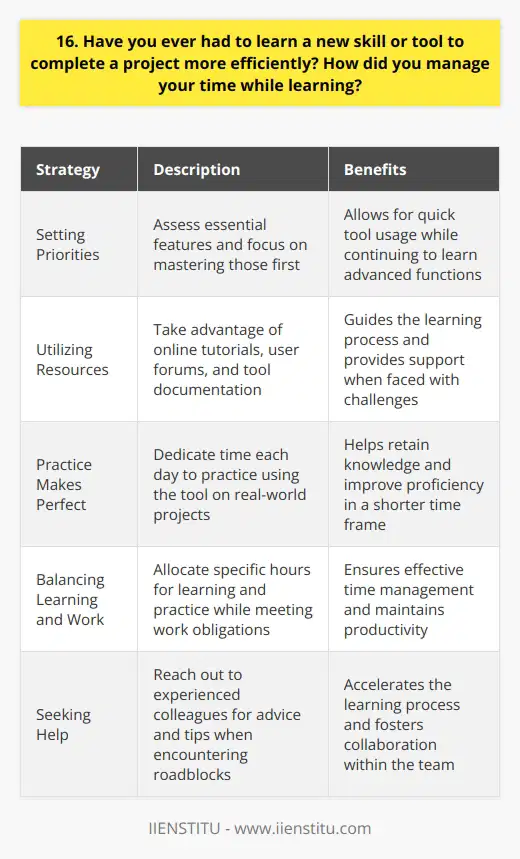
17. Describe a time when you had to manage a project with limited resources. How did you allocate your time and resources effectively?
In my previous role as a marketing coordinator, I managed a project with a tight budget and deadline. To allocate time and resources effectively, I first identified the project's key objectives and priorities. Then, I broke down the project into smaller, manageable tasks and assigned them to team members based on their skills and availability.
Prioritizing Tasks
I focused on the most critical tasks that directly impacted the project's success. I postponed or eliminated non-essential tasks to save time and resources. This allowed us to concentrate our efforts on what mattered most.
Leveraging Existing Resources
To maximize our limited resources, I looked for ways to utilize existing assets and tools. We repurposed content from previous campaigns and leveraged our in-house talent for design and copywriting. This helped us avoid unnecessary expenses and stay within budget.
Collaborating and Communicating
I fostered a collaborative environment where team members could share ideas and support each other. Regular check-ins and open communication kept everyone on the same page and allowed us to quickly address any challenges or roadblocks.
By being strategic, resourceful, and adaptable, we successfully completed the project on time and within budget. This experience taught me the importance of effective resource allocation and teamwork in achieving project goals.
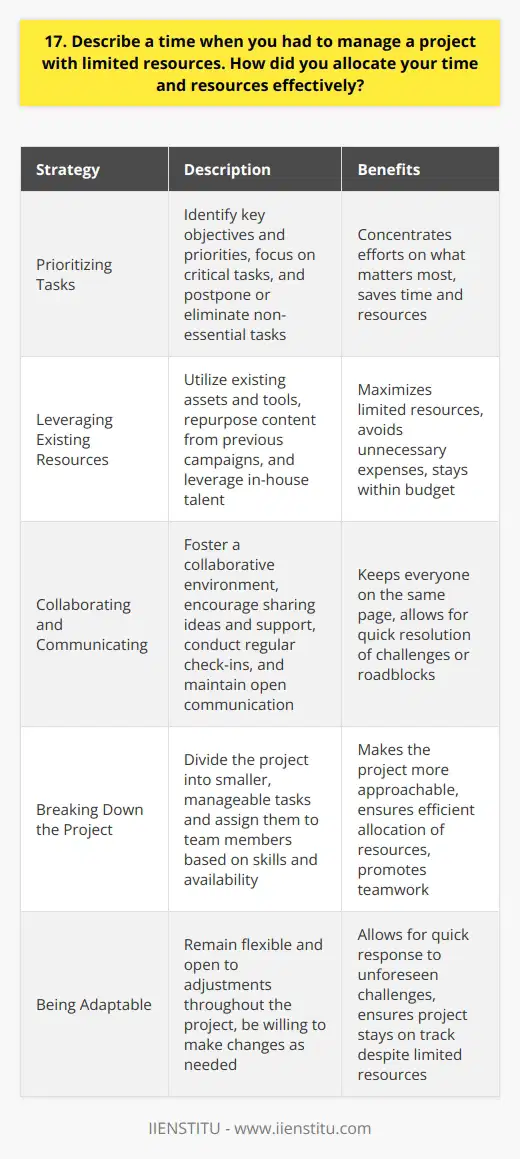
18. How do you stay organized and keep track of your tasks and deadlines?
I stay organized by using a combination of digital tools and old-fashioned pen and paper. I rely on my trusty planner to keep track of deadlines, meetings, and important tasks. Writing things down helps me remember them better.
Digital Tools
For day-to-day task management, I use Trello. It's a fantastic app that lets me create boards for different projects. I can easily drag and drop tasks between lists as their status changes. Setting due dates keeps me on track.
Google Calendar is my go-to for scheduling. I block off time for deep work and add reminders for key milestones. Seeing my week at a glance helps me plan ahead and stay on top of things.
Prioritization Techniques
Not all tasks are created equal. I use the Eisenhower Matrix to prioritize my to-do list. It's a simple four-quadrant system:
Communication is Key
Staying organized isn't just about managing your own workload. I make sure to communicate clearly with my team. We have regular stand-up meetings to share progress and identify blockers. Open lines of communication prevent misunderstandings and keep projects moving forward.
At the end of the day, organization is about finding a system that works for you. It's an ongoing process of iterations and improvements. I'm always looking for ways to optimize my workflow and boost my productivity.
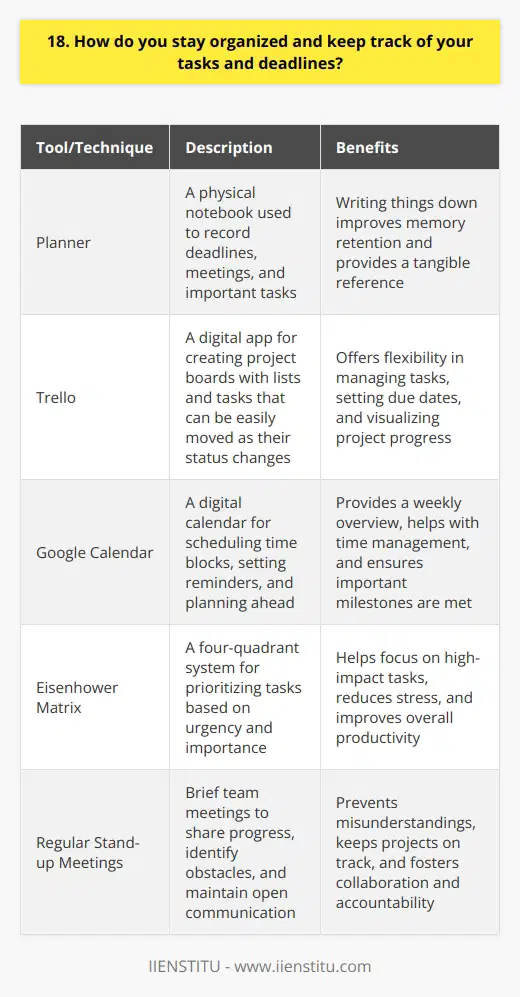
19. Have you ever had to work with a client or stakeholder who had unrealistic expectations? How did you manage your time and communicate effectively?
Yes, I have worked with clients who had unrealistic expectations. In one particular project, the client wanted numerous additional features without extending the deadline or budget.
Prioritizing Tasks
To manage my time effectively, I first prioritized the essential tasks that were critical to the project's success. I focused on delivering the core functionalities before addressing any extra requests.
I broke down the project into smaller, manageable tasks and set realistic milestones. This helped me stay organized and track my progress.
Communicating with the Client
I scheduled regular meetings with the client to discuss their expectations and provide updates on the project's status. During these meetings, I listened attentively to their concerns and ideas.
I politely explained the limitations and constraints we faced in terms of time and resources. I offered alternative solutions that could meet their needs without compromising the project's quality or timeline.
Setting Clear Boundaries
I learned to set clear boundaries with the client. I explained what was achievable within the given timeframe and budget. I also highlighted the potential risks of adding too many features without proper planning.
Collaborating with the Team
I worked closely with my team members to ensure everyone was on the same page. We regularly communicated our progress, challenges, and ideas to stay aligned with the project's goals.
By fostering a collaborative environment, we were able to support each other and find creative solutions to meet the client's expectations while staying within the project's scope.
Lessons Learned
This experience taught me the importance of setting realistic expectations from the start. I learned to communicate clearly, prioritize tasks, and work collaboratively to deliver successful projects, even in challenging situations.
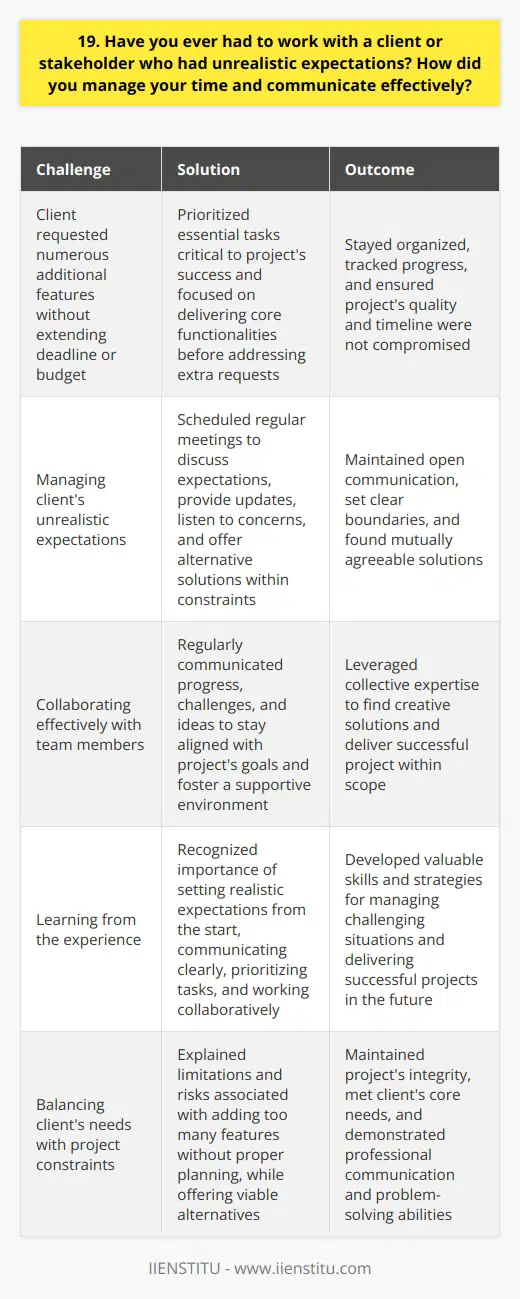
20. Describe a time when you had to prioritize tasks based on their importance and urgency. How did you make those decisions?
In my previous role as a project manager, I often had to prioritize tasks based on importance and urgency. One particular instance that comes to mind was when we were working on a tight deadline for a client's website launch. There were numerous tasks to complete, but not all of them were equally critical.
Assessing Importance and Urgency
To make decisions, I first assessed each task's importance in relation to the project's overall success. I asked myself, "Which tasks are absolutely essential for the website to function properly and meet the client's requirements?" Then, I considered the urgency of each task, taking into account the time required to complete it and any dependencies on other tasks.
Prioritizing and Delegating
Based on this assessment, I created a prioritized list of tasks. I put the most important and urgent tasks at the top of the list and assigned them to team members with the necessary skills. Less critical tasks were delegated to other team members or postponed until after the launch.
Communicating with the Team
Throughout the process, I communicated clearly with my team about the priorities and expectations. We had regular check-ins to ensure everyone was on track and to address any challenges that arose. It was important to me to keep the team informed and engaged, as their input and collaboration were key to our success.
In the end, by prioritizing tasks based on importance and urgency, we were able to launch the website on time and to the client's satisfaction. This experience taught me the value of effective prioritization and communication in managing projects and meeting goals.
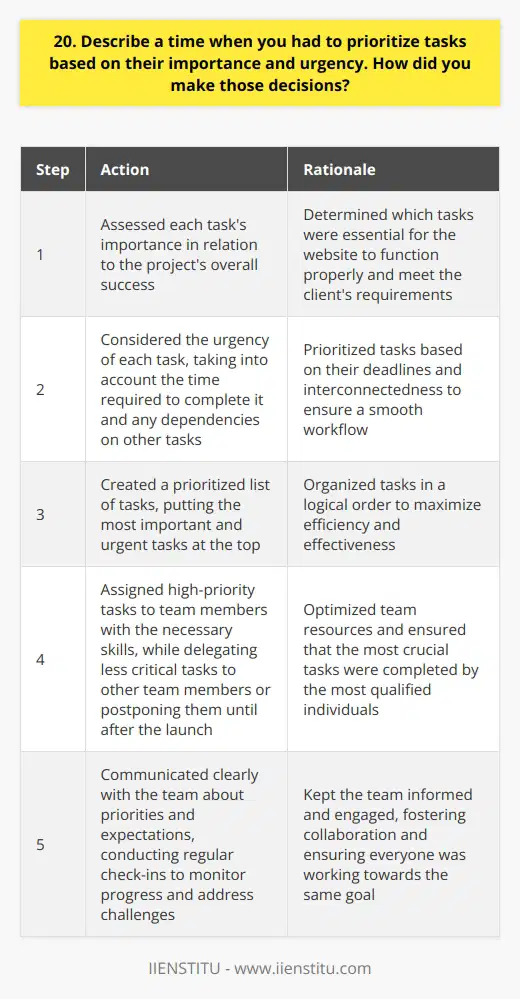
21. How do you handle distractions and stay focused on your work?
I've developed several strategies to maintain focus and avoid distractions while working. First, I prioritize my tasks and create a daily schedule to stay organized. This helps me tackle the most important and time-sensitive projects first.
Minimizing Distractions
To minimize distractions, I put my phone on silent mode and limit checking emails or messages to designated breaks. If I'm working on a complex task requiring deep concentration, I'll close my office door or put on noise-canceling headphones. I've found that reducing visual and auditory distractions really helps me stay in the zone.
Taking Breaks
While it may seem counterintuitive, I've learned that taking short breaks actually boosts my productivity and focus. Every 60-90 minutes, I'll step away from my desk for 5-10 minutes to stretch, grab a healthy snack, or do a quick mindfulness exercise. These brief mental and physical breaks prevent burnout and help me return to work feeling refreshed.
Staying Motivated
To stay motivated, I break large projects into smaller, manageable tasks. Checking items off my to-do list gives me a sense of progress and accomplishment. I also remind myself of my professional goals and how each project contributes to achieving them.
In summary, through organization, reducing distractions, taking rejuvenating breaks, and maintaining motivation, I'm able to stay focused and productive, even amid potential disruptions. It's an approach I've refined over time and one that I believe would translate well to this role.
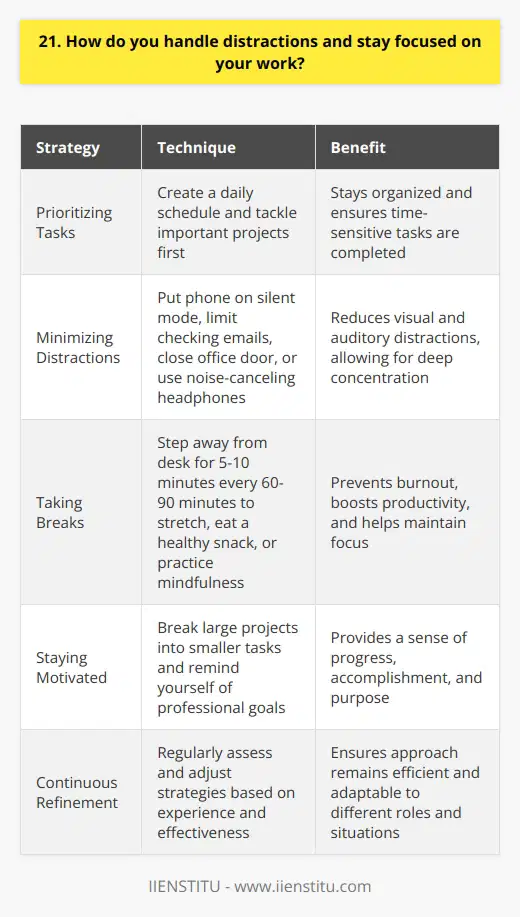
22. Have you ever had to work on a project that required a lot of attention to detail? How did you manage your time to ensure accuracy?
In my previous role as a financial analyst, I worked on a project that required meticulous attention to detail. It involved reconciling transaction records across multiple systems to ensure accuracy.
Managing Time Effectively
To manage my time effectively, I broke the project down into smaller, manageable tasks. I set realistic deadlines for each task and prioritized them based on their importance and urgency.
I also allocated specific time blocks in my calendar dedicated solely to this project. During these focused work sessions, I minimized distractions by closing unnecessary tabs and silencing notifications.
Ensuring Accuracy
To ensure accuracy, I double-checked my work at regular intervals. I compared the data across systems and investigated any discrepancies I encountered.
I also collaborated closely with my team members, cross-referencing our findings to catch any errors or inconsistencies. We held regular check-ins to discuss progress and address any challenges promptly.
Lessons Learned
Through this experience, I learned the importance of staying organized and focused when working on detail-oriented projects. Breaking tasks into smaller steps and setting clear deadlines kept me on track.
I also realized the value of collaboration and seeking feedback from others. Having multiple eyes on the work helped identify errors that I might have overlooked on my own.
Overall, this project taught me valuable lessons in time management, attention to detail, and effective communication. I believe these skills would serve me well in this role and contribute to the success of future projects.
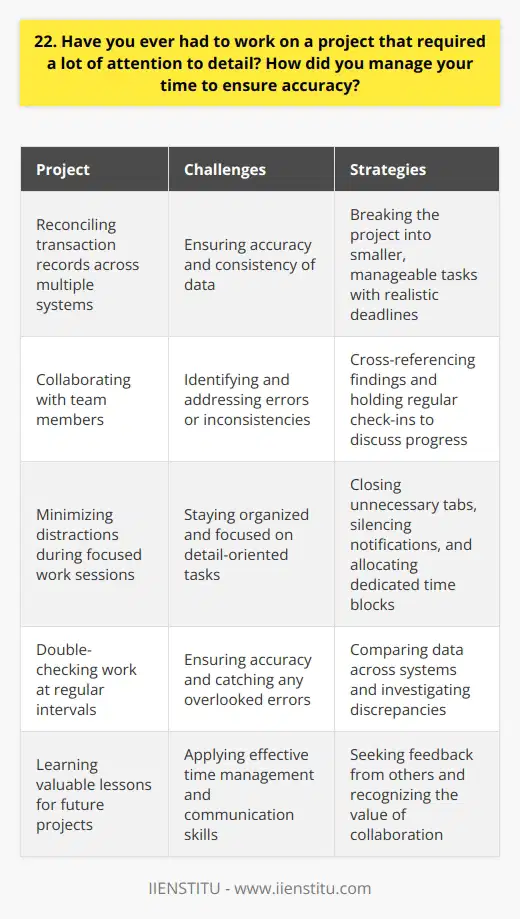
23. Describe a time when you had to manage your time effectively while working remotely.
As a remote worker, I've learned the importance of effective time management. One particularly challenging experience taught me valuable lessons.
Setting Clear Priorities
I had multiple projects with overlapping deadlines. I quickly realized I needed to prioritize tasks based on urgency and importance. By focusing on the most critical tasks first, I ensured I made steady progress on all fronts.
Creating a Schedule
To stay organized, I created a daily schedule with specific time blocks for each task. This helped me stay focused and avoid getting sidetracked by less important activities. I also built in some flexibility to handle unexpected issues that inevitably arose.
Taking Regular Breaks
I discovered that taking short breaks every hour or so helped me maintain my productivity over the long haul. Stepping away from my desk, stretching, and refocusing my mind prevented burnout and kept me sharp.
Communicating with My Team
Regular check-ins with my team were crucial. We used video calls and instant messaging to stay connected and aligned. Proactively communicating my progress, roadblocks, and needs ensured everyone was on the same page.
Leveraging Technology
I relied on tools like project management software, time tracking apps, and calendar reminders to keep myself organized and accountable. These tools automated routine tasks and freed me up to focus on high-impact work.
In the end, I successfully met all my deadlines and delivered quality work, despite the challenges of working remotely. The experience taught me the power of planning, prioritization and self-discipline in managing my time effectively.
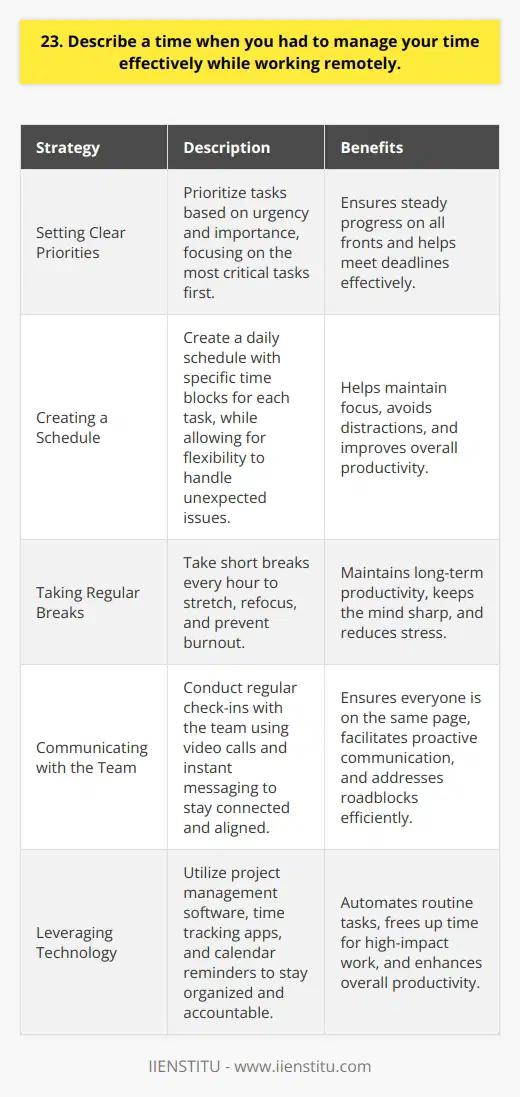
24. How do you handle tasks that take longer than expected?
When faced with tasks that take longer than expected, I approach the situation calmly and methodically. I first assess the reasons behind the delay and identify any potential obstacles or complications. This helps me devise a plan to address the issues effectively.
Next, I prioritize the essential components of the task and focus on completing them efficiently. By breaking the task into smaller, manageable parts, I can make steady progress and avoid feeling overwhelmed. Throughout the process, I maintain open communication with my team and supervisors, providing regular updates on my progress and any challenges I encounter.
Adapting to Changing Circumstances
In my previous role, I once encountered a project that took significantly longer than anticipated due to unexpected changes in client requirements. Instead of becoming discouraged, I took the initiative to collaborate closely with the client and my team to understand the new expectations thoroughly. I then restructured my approach, reallocated resources, and worked extra hours to ensure we delivered a high-quality result within the revised timeline.
Leveraging Lessons Learned
Handling tasks that take longer than expected also provides valuable opportunities for growth and improvement. I take the time to reflect on the experience, identifying areas where I can optimize my processes or acquire new skills to enhance my efficiency in the future. By embracing these challenges as learning experiences, I continuously develop my abilities and become better equipped to handle similar situations in the future.
In summary, when faced with tasks that take longer than expected, I remain composed, prioritize effectively, communicate openly, and adapt to changing circumstances. I view these challenges as opportunities for growth and use the lessons learned to continuously improve my performance.
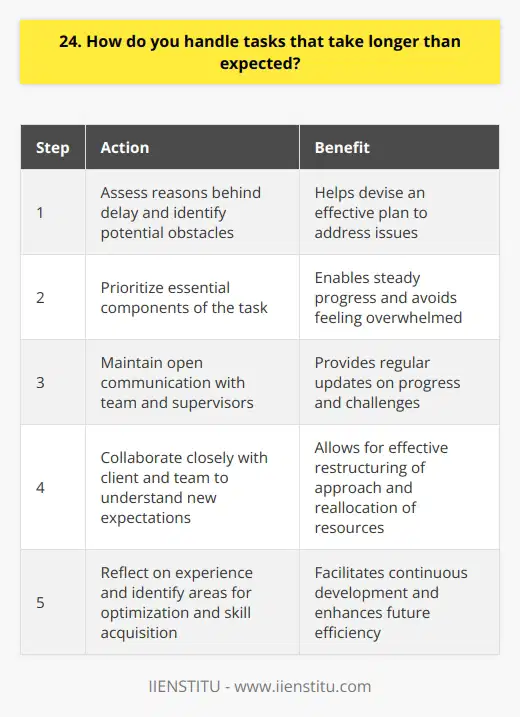
25. Have you ever had to work with a team member who had a different work style or pace? How did you adapt your time management approach?
Throughout my career, I've collaborated with individuals who have diverse work styles and paces. I remember one particular project where my teammate had a more laid-back approach, while I preferred a structured and fast-paced environment.
Adapting to Different Work Styles
To ensure successful collaboration, I took the initiative to understand my colleague's perspective and find common ground. We openly discussed our preferred working methods and found ways to leverage our strengths.
I adjusted my timeline to accommodate their style while still meeting project deadlines. Regular check-ins helped us stay aligned and address any concerns promptly.
Effective Communication is Key
Open and honest communication was crucial in bridging the gap between our work styles. We set clear expectations, defined roles and responsibilities, and established a shared vision for the project.
By actively listening to each other's ideas and providing constructive feedback, we fostered a collaborative and respectful working relationship.
Focusing on Results
Despite our differences in work style and pace, we remained focused on achieving the desired outcomes. I prioritized tasks based on their impact and urgency, ensuring that critical milestones were met.
Flexibility and adaptability were essential in accommodating my teammate's approach while still maintaining my own productivity and efficiency.
In the end, our combined efforts led to a successful project delivery. The experience taught me the importance of embracing diversity in work styles and finding ways to collaborate effectively.
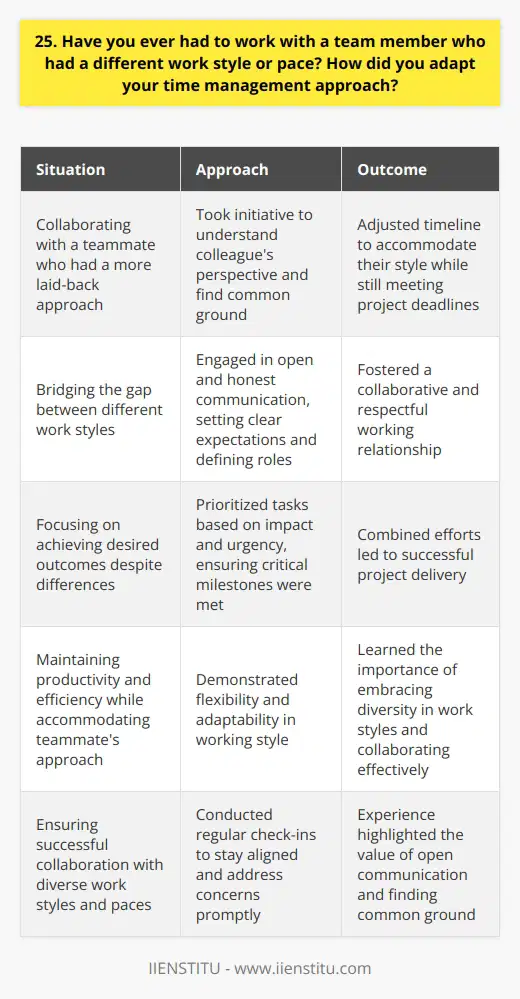
26. Describe a time when you had to manage your time effectively while also providing support or guidance to others.
During my time as a project manager, I had to juggle multiple tasks while guiding my team. One particular instance stands out where I had to manage my time effectively while providing support.
Balancing Deadlines and Team Needs
We were working on a tight deadline for a client project. I had my own responsibilities to fulfill, but I also needed to ensure my team had the resources and guidance they required.
Prioritizing and Delegating
To manage my time, I prioritized my tasks based on urgency and importance. I delegated some of my responsibilities to capable team members, trusting in their abilities.
This allowed me to focus on critical tasks while still being available to answer questions and provide direction.
Regular Check-Ins and Communication
I scheduled regular check-ins with my team to assess progress and address any concerns. We used collaboration tools to keep communication channels open and transparent.
By maintaining open lines of communication, I could quickly respond to any issues or questions that arose.
Successful Project Delivery
Through effective time management and providing the necessary support, we successfully delivered the project on time. The client was satisfied with the results, and my team felt supported throughout the process.
This experience taught me the importance of balancing individual responsibilities with team leadership. It highlighted my ability to manage competing priorities while ensuring the success of both my team and the project.
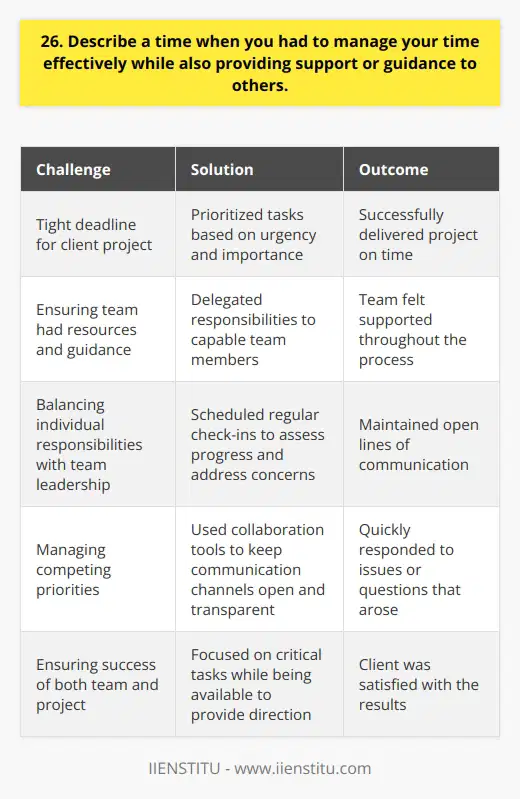
27. How do you prioritize your tasks when everything seems equally important?
When everything seems equally important, I take a step back and assess the situation objectively. I consider factors such as urgency, impact, and dependencies to determine which tasks require immediate attention.
Identifying Urgent Tasks
I look for tasks with pressing deadlines or those that have significant consequences if not completed promptly. These urgent tasks take top priority, as their timely completion is critical to the success of the project or the organization.
Evaluating Impact
Next, I evaluate the potential impact of each task. I prioritize tasks that have the greatest influence on achieving goals, delivering value to clients, or driving the company's mission forward. High-impact tasks are given more weight in my prioritization process.
Considering Dependencies
I also consider the dependencies between tasks. If a particular task is a prerequisite for others to progress, I prioritize it accordingly. By tackling tasks that unlock subsequent work, I ensure a smooth flow of operations and prevent bottlenecks.
Communicating and Collaborating
Throughout the prioritization process, I maintain open communication with my team and stakeholders. I seek their input and feedback to ensure alignment and make informed decisions. Collaboration helps me gain a comprehensive understanding of priorities from different perspectives.
Ultimately, effective prioritization requires a combination of strategic thinking, adaptability, and effective communication. By continuously assessing and adjusting priorities based on changing circumstances, I ensure that I focus my efforts on the most critical tasks that drive results.
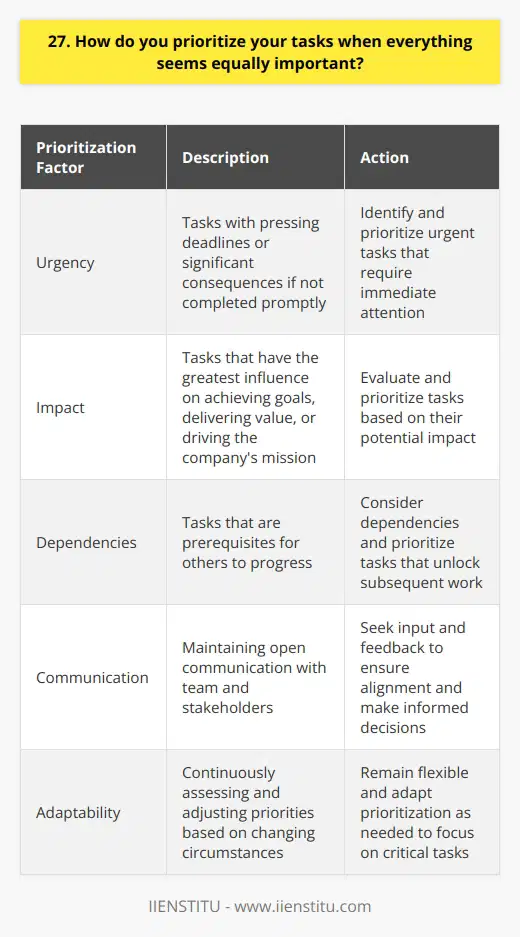
28. Have you ever had to work on a project with a moving target or changing requirements? How did you manage your time and adapt to the changes?
Adapting to Change
I once worked on a marketing campaign with constantly shifting goals and requirements. It was challenging, but I learned to be flexible and communicate effectively with my team.
Staying Organized
To manage my time, I broke the project down into smaller tasks. I prioritized what needed to get done each week based on the latest information from our client. Keeping detailed to-do lists and notes helped me stay on track.
Frequent Check-Ins
I scheduled regular check-in meetings with my manager and the client to get updates and clarify expectations. This kept everyone on the same page and allowed us to pivot quickly when needed.
Expecting the Unexpected
Rather than getting frustrated by the changes, I tried to anticipate them. I built buffer time into my schedule and had contingency plans ready. Staying positive and proactive was key to adapting smoothly.
Lessons Learned
In the end, we delivered a successful campaign despite the moving target. I'm proud of how our team collaborated and remained agile. The experience taught me the importance of flexibility, communication, and a good attitude when dealing with change.
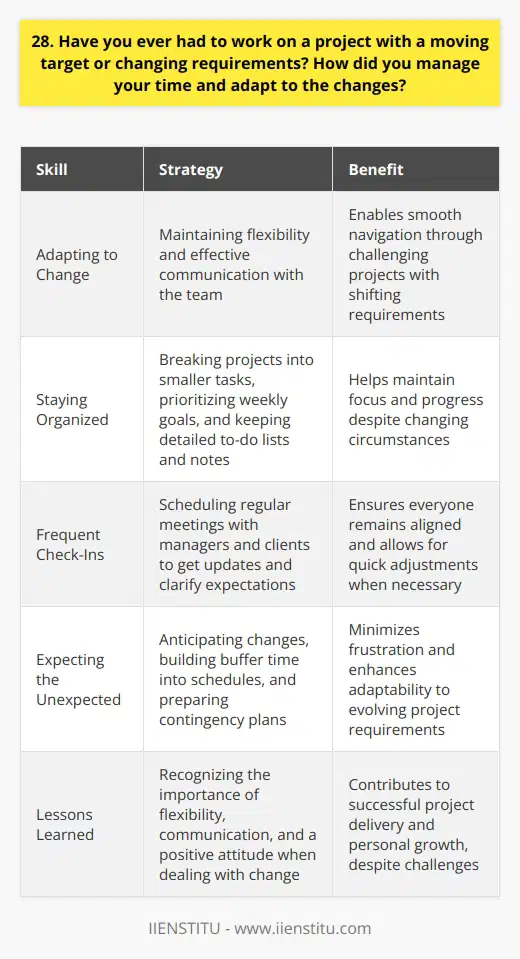
29. Describe a time when you had to manage your time effectively while also dealing with personal or family responsibilities.
One time, I had to juggle a tight deadline at work with a family emergency. My sister called me in the morning, distraught because her car had broken down and she needed to get to an important appointment.
Prioritizing Tasks
I quickly assessed the situation and realized I needed to prioritize my tasks effectively. I made a list of the most critical items on my work agenda and estimated how much time each would take.
Delegating Responsibilities
Next, I reached out to my colleagues and explained the situation. I asked if they could help with a few tasks, and they were happy to pitch in. This freed up some time in my schedule.
Communicating with My Boss
I also spoke with my boss about the family emergency. She was very understanding and allowed me some flexibility in my schedule that day, as long as I met the deadline.
Helping My Sister
With my work tasks under control, I was able to take a longer lunch break to pick up my sister and drive her to her appointment. We made it just in time, and she was so grateful for the help.
Meeting the Deadline
I spent the afternoon focusing intently on my remaining tasks, working efficiently to make up for the lost time. Thanks to my prioritization, delegation, and communication, I was able to meet the deadline successfully, while also being there for my sister during her time of need.
This experience taught me the importance of being adaptable and proactive in managing my time. By staying organized, communicating openly, and being willing to ask for help when needed, I was able to navigate a challenging situation and meet both my professional and personal responsibilities.
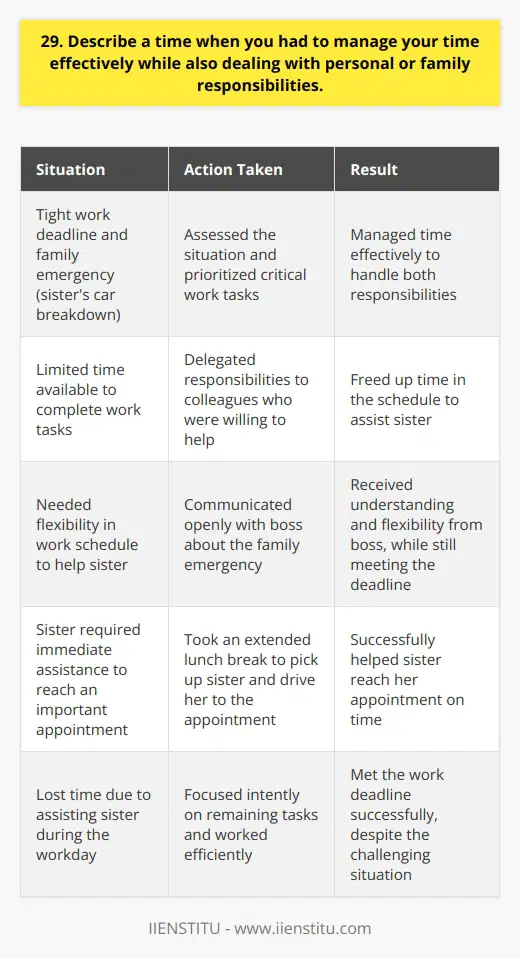
30. How do you ensure that you are making the best use of your time each day?
I'm a firm believer in the power of planning and prioritization. Every morning, I take a few minutes to review my tasks for the day and identify the most critical ones. I break them down into smaller, manageable steps and allocate specific time slots for each.
Minimizing Distractions
To make the most of my time, I minimize distractions. I silence my phone notifications and close unnecessary browser tabs. When working on important tasks, I find a quiet space to fully concentrate.
Using Time-Tracking Tools
I use time-tracking tools to monitor how I spend my time. This helps me identify areas where I may be procrastinating or spending too much time on low-priority tasks. By analyzing my time usage, I can make adjustments to improve my productivity.
Taking Regular Breaks
Taking regular breaks is crucial for maintaining focus and avoiding burnout. I use the Pomodoro Technique, working in 25-minute intervals followed by short breaks. During these breaks, I step away from my desk, stretch, or engage in a brief relaxation exercise.
Saying No to Non-Essential Tasks
I've learned the importance of saying no to non-essential tasks or requests that don't align with my priorities. By politely declining or delegating when appropriate, I can focus on the tasks that truly matter and make the best use of my time.
Overall, effective time management is about being intentional, staying organized, and continuously refining my approach. By implementing these strategies, I ensure that I'm making the most of each day and achieving my goals efficiently.
